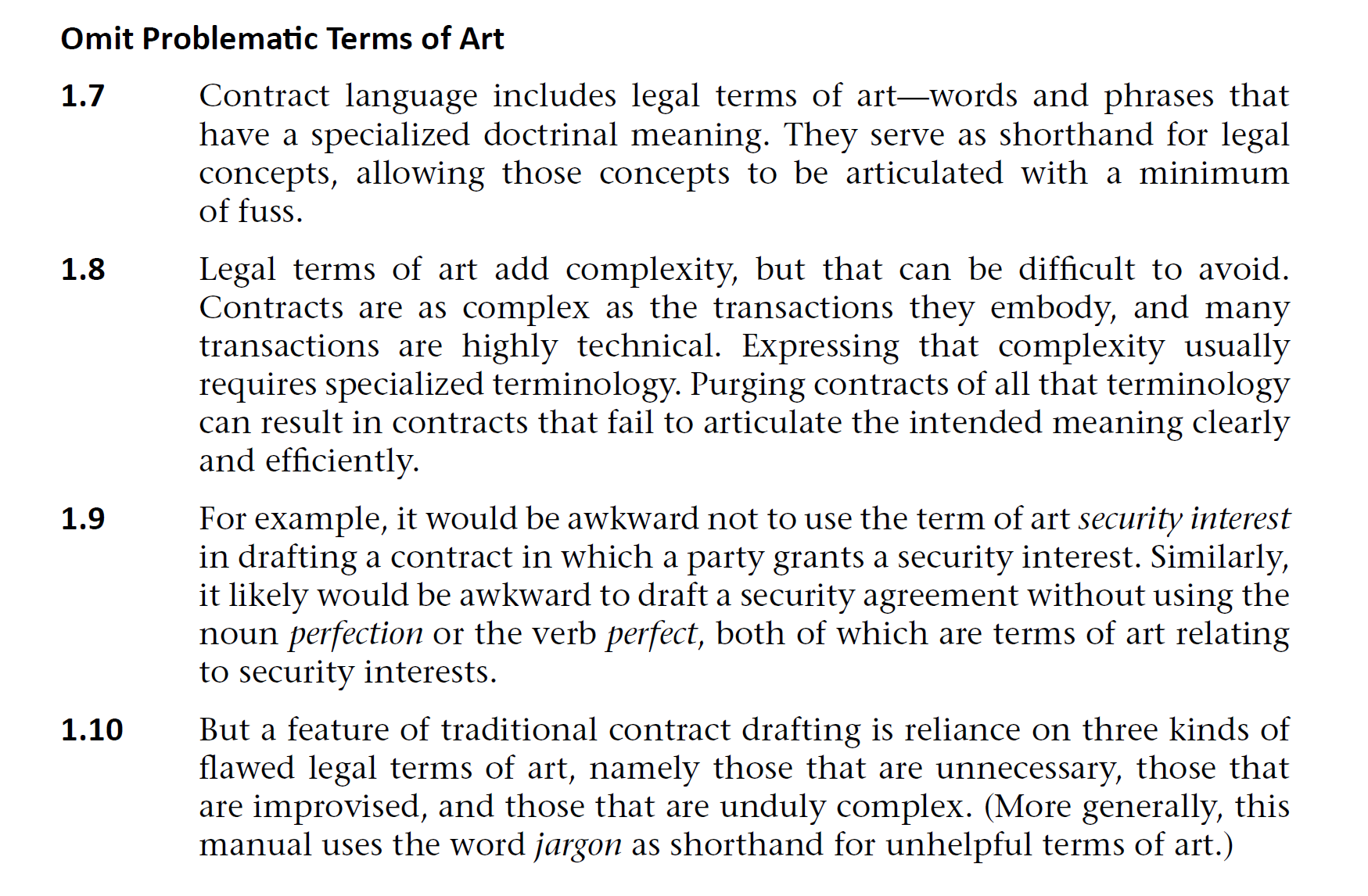A few days ago I encountered the word coterminous for the first time … ever? Of course, it was in a contract.
Here’s the Blacks Law Dictionary definition:
coterminous (koh-tər-mə-nəs) adj. (18c) 1. (Of ideas or events) coextensive in time or meaning <Judge Smith’s tenure was coterminous with Judge Jasper’s>.
Is coterminous a worthwhile term of art, or is it jargon? Here’s how MSCD articulates that distinction:
So let’s assess coterminous. It’s a clunky word, and it’s relatively obscure. I spend all sorts of quality time on EDGAR and I wasn’t familiar with coterminous. And it doesn’t offer a convenient way to express a complex idea—its meaning is simple.
Here are some random examples from EDGAR, with text using coterminous in strikethrough italics and my alternative in bracketed italics:
LIBOR Loans may not be outstanding under more than 10 separate Interest Periods at any one time (for which purpose Interest Periods shall be deemed to be separate even if they are
coterminous[for the same term]);Landlord and Tenant now desire to enter into this Fourth Amendment to memorialize their agreement to provide for the expansion of the Existing Premises … for a term
to be coterminous with[that is the same as that for] the Existing Premises under the Lease; and in connection therewith to modify certain other terms and conditions of the Lease , all as further described in this Fourth Amendment.Upon written request by Tenant, Landlord shall grant upon commercially reasonable terms, a license
coterminous with[for the same term as] the Lease Term to one or more reputable telecommunications utility provider(s) designated by Tenant …This Appendix shall be effective upon the Effective Date and shall
be coterminous with[be for the same term as] the Agreement unless either Party provides written notice of intent not to renew at least one hundred and eighty (180) days prior to the expiration date of the Extension Period.The term of this Agreement shall
be coterminous with the term of[be for the same term as] the Pledge and Security Agreement.
I’m confident you could tweak my versions, but I’m sufficiently satisfied with them to say the heck with coterminous.
But there’s another issue: if the term of the other contract ends, does that result in termination of your contract? I wouldn’t rely on coterminous to express that. I’d be explicit about it.
But it’s to the credit of the transactional world that coterminosity doesn’t appear on EDGAR. Go here for a Guardian item featuring coterminosity.


I’ve never seen coterminous in a contract. But I do encounter it somewhat frequently when discussing the need to get multiple contracts aligned on expiration dates. Usually, when you can swap several words for one, it’s a good trade. Though I am tantalized by your hypo where two contracts are “conterminous” as stated in either or both of the agreements and one is terminated early.
Note that “coterminous” and “conterminous” are often treated as the same word, although I don’t believe they were at one time. The most common usage refers to the lower 48 states. But people frequently use “contiguous” for that.
Wow. So I kind of thought this was one of those “lawyer words” that showed up all the time in older agreements. And a particularly pretentious one, I always thought.
Maybe it was all the rage only in the smaller circles I traveled starting out.
We use coterminous in drafting for local governments (more for legislative than contractual drafting). We use it when the boundaries of two jurisdictions are the same. For example, a coterminous township is a township that has the same boundaries as a city. I don’t think I’ve seen it used outside of this context.
We use this in commercial leasing now and then when one lease might be coterminous with another. It’s a generally understood term in the leasing context.
I come across it fairly frequently and generally in the context of SOWs or Amendment under an existing MSA or Software License Agreement where the goal – after years have run and numerous SOW/Orders have accumulated addressing different software products – is align software license terminations so they aren’t all expiring or renewing at different points in the year/Term. In THIS context it’s VERY well understood and common.
Ken, I think there’s a distinction between saying a term of agreement shares boundaries with another (I would use “coterminous”), and saying a term is the same duration (potentially expressed as you have, “for the same term”). I use coterminous in contracts to express that, for example, one subscription will end at the same time as another. If I said that they are “for the same term” then I might be stuck with staggered subscriptions, one starting later than the other, but both lasting, say, one year.
My understanding of the definition of coterminous is that the focus is on the boundaries in common, namely the terminating boundary. Black’s law uses “coextensive”, which I think is the same. I think other dictionary sources support that as well.
https://www.merriam-webster.com/dictionary/coterminous
https://dictionary.cambridge.org/us/dictionary/english/coterminous
It’s a bit surprising to see it treated as archaic. I always thought it was an economical word choice. Otherwise, I’d have to describe how the subscription “lasts until the end of the Subscription Term of the then-existing subscriptions” or something similar.